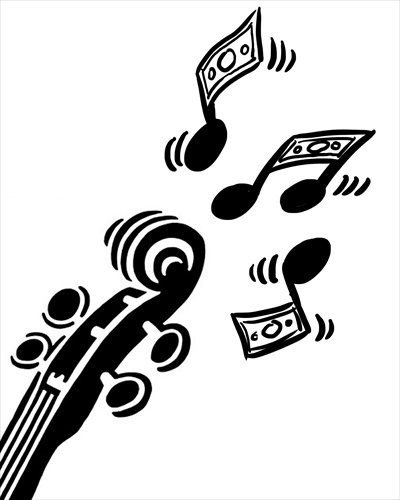 |
| (Illustration: GT/Liu Rui) |
For most Chinese, myself included, an art troupe, music band or individual that performs in Vienna's Goldener Saal, or Golden Hall, naturally commands immediate respect and admiration. After all, the Golden Hall has long been venerated in China as representing the peak of classical European music. So anybody who performs there must be at the top of their profession, right?
This firm belief is why the recent revelation has been so shocking that more than 130 Chinese artistic troupes and performers so far this year have got on the most famous stage in Vienna's Musikverein and that most of the performances have been poorly attendance.
In some cases, audience members are solicited by local Chinese associations, which help dole out free tickets to Chinese residents in the city. As a result, audience members whispering, people moving in and out of the hall, children playing and mobile phone ringing are a matter of course during many of the performances.
The Golden Hall first became known in China since 1998 when the China Central Folk Orchestra first played there at a special New Year concert. Since then, it has gained an unrivaled reputation in China as the highest temple of music.
This might be a fallacy or misconception, but for many people, a performance at the Golden Hall amounts to something of a coup in the ascendancy of the artistic peak.
Prestige, or rather the pursuit of prestige, obviously, plays a major role in the reported scandal of Chinese performers going to Vienna in droves despite poor acceptance by local audiences.
Since a performance in the Golden Hall, where the Vienna Philharmonic Orchestra performs every year, guarantees instant market recognition, at least in China, there's a strong motivation for Chinese performers to hog the limelight.
As a matter of fact, the Golden Hall is a place for music lovers or ordinary musicians, who gather there regularly to practice or perform. As long as you can afford the 20,000 to 30,000 euros rental fee, you will be given access to rehearse or perform in the hall, regardless of your music skills or qualification.
With chances like this, some Chinese music troupes and individuals naturally exploit them to their fullest. Some young music school students even make their performance in the Golden Hall as a shortcut to better market their music talents.
Slapping a performance in the Golden Hall on a record is a shortcut to better sales, or a way to boast on one's CV. And with corruption rampant in China's music industry, as some musicians have criticized, paying for the privilege legally seems pretty natural.
It is easy to point fingers at those performers or organizers for their vain and sometimes ridiculous activities. But as part of the public, aren't we as guilty as those performers? Isn't it our blind belief in the name of the Golden Hall that prompts them to buy a performance chance there?
Worshipping more developed Western society is part of the modern Chinese psyche. Partly due to their economic strength, advanced technology and social development, Western countries usually enjoy a favorable image in the eyes of many Chinese.
A college diploma from the US or an European country reinforces one's competitive edge in the job market. Similarly, a performance in the Vienna Golden Hall secures a reputation in China.
The mentality, or cultural inferiority complex, sometimes leaves Chinese acting in a silly fashion during the process of scrambling for foreign recognition, such as the Golden Hall craze.
With the latest scandal being widely covered and heatedly debated, hopefully people will learn that the Golden Hall may be littered with talented music artists, but not every performer there is necessarily talented. The halo of the Golden Hall, as a result, may also start to fade.
 2013 Colour Me Rad 5K run held in Canada
2013 Colour Me Rad 5K run held in Canada China's destroyer Qingdao sails out of Sydney Harbor
China's destroyer Qingdao sails out of Sydney Harbor Chinese tycoon aims to restore London's Crystal Palace
Chinese tycoon aims to restore London's Crystal Palace Worst flooding hits Yuyao, 70% of downtown area underwater
Worst flooding hits Yuyao, 70% of downtown area underwater Game for the brave: 'Spiders' in Yandang Mountains
Game for the brave: 'Spiders' in Yandang Mountains Hungarian wingsuit flyer confirmed dead in Zhangjiajie
Hungarian wingsuit flyer confirmed dead in Zhangjiajie New couples take wedding photos during holiday
New couples take wedding photos during holiday Serena Williams stumbles through to quarterfinals
Serena Williams stumbles through to quarterfinals Thailand Mobile Expo 2013 kicks off
Thailand Mobile Expo 2013 kicks off Photo collection of Chinese Navy
Photo collection of Chinese Navy Photo story: Young tenants in Beijing
Photo story: Young tenants in Beijing Twins Culture Festival kicks off in Beijing
Twins Culture Festival kicks off in Beijing UNESCO world heritage site: Montale Tower
UNESCO world heritage site: Montale Tower Israeli drone crashes into Mediterranean, fragments recovered
Israeli drone crashes into Mediterranean, fragments recovered Serena Williams wins second China Open title
Serena Williams wins second China Open titleDay|Week|Month